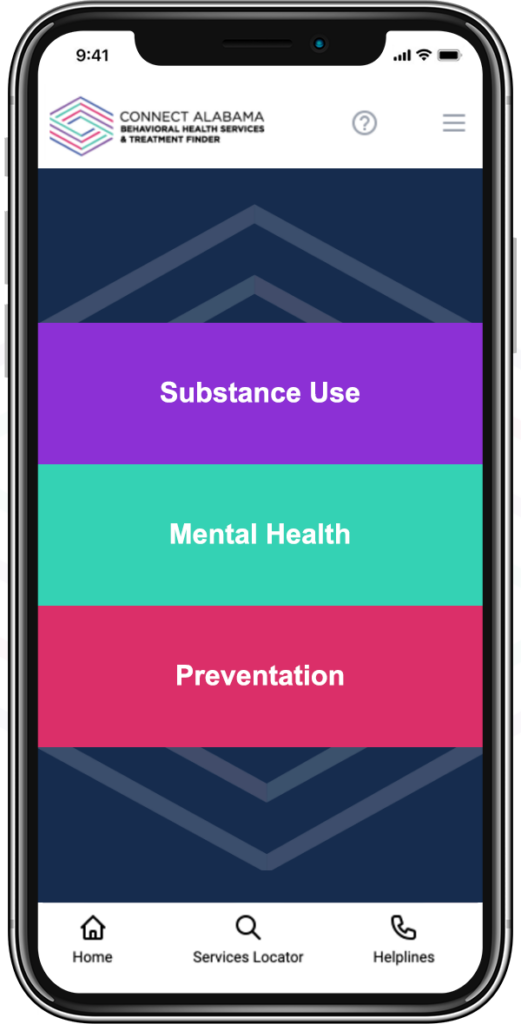Your mind and body are deeply interconnected, influencing each other in ways you may not even be aware of. For example, stress and anxiety can manifest as fatigue, headaches, or even a weakened immune system. Likewise, chronic pain or illness can affect your mental and emotional well-being.
A holistic approach to health ensures that both your mind and body work in harmony, which helps you feel your best.


Download the Connect Alabama App
Resources for Mind-Body Wellness in Alabama

-
Local Wellness Centers and Programs
The Wellness Coalition and many yoga studios across Alabama offer yoga, meditation, fitness classes, and holistic health coaching.
The Alabama Department of Mental Health also runs community fitness programs to promote well-being.
-
Support Groups and Counseling Services
The following organizations offer counseling services and support groups to reduce social isolation and create a safe space to share your psychological distress:
- Alabama Department of Mental Health
- UAB Community Counseling Clinic
- The National Alliance on Mental Illness (NAMI)
- Auburn University Psychological Services Center
- JBS Mental Health Authority
-
Online Tools and Mobile Apps for Tracking Health
The MyFitnessPal app tracks physical activity and fitness, while Calm offers guided meditation and relaxation techniques. Additionally, platforms like the Sleep Cycle app monitor your sleep health, including sleep stages, interruptions, and duration.
The Connection Between Mental and Physical Health

-
How Stress Impacts Your Body
When you’re stressed, your body activates its “fight or flight” response. Your body releases hormones like cortisol and adrenaline to help you face perceived threats. While the response is useful in short bursts during emergencies, chronic stress can cause a ton of harm, including digestive issues, headaches, a weakened immune system, and high blood pressure.
Fortunately, there are ways you can manage stress before it consumes your well-being. Deep breathing exercises can help to calm your nervous system; regular getting up and moving throughout the day can help release built-up tension.
-
The Role of Hormones in Mental Health
Various glands in the body release chemical messengers (i.e., hormones) that regulate essential bodily functions, including energy levels, mood, and cognition. These hormones play a huge role in shaping our emotional responses, managing stress, and supporting mental clarity.
For instance, serotonin influences mood and feelings of happiness, while cortisol (the stress hormone) can increase anxiety when elevated for long periods. Dopamine, thyroid hormone, and estrogen imbalances may also impact focus, mood, and your well-being.
Simple lifestyle choices, such as eating a nutritious diet, exercising regularly, and getting enough sleep, help regulate hormones naturally.
-
Physical Illnesses Linked to Mental Health Conditions
Poor mental health can cause or worsen physical illnesses. Chronic depression puts pressure on the cardiovascular system, increasing the risk of heart disease. Stress eating and hormonal imbalances also expose you to diabetes, both of which are preventable physical health conditions with proper self-care.
Anxiety and stress are also closely tied to gastrointestinal issues, often triggering or intensifying symptoms of things like irritable bowel syndrome (IBS).
Integrated care that addresses both physical and mental health is crucial. By treating both aspects simultaneously, you can improve treatment outcomes and reduce the long-term impact of these interconnected conditions.
How Physical Health Affects Mental Health

-
The Importance of Exercise for Mental Well-Being
Physical activity triggers endorphin production, which helps to improve mood and relieve stress. When you exercise, you often also sleep better and feel more energized during the day.
Plus, you don’t need intense workouts to enjoy feeling your best. Even simple activities like stretching, walking, or doing yoga can help you relax and clear your mind. No matter your fitness level, a short walk or a few minutes of mindful movement can improve your mental health.
-
Nutrition and Its Role in Mental Health
Your brain’s function is closely linked to your diet. For example, omega-3 fatty acids, which are found in fish like salmon, support mood regulation and cognitive health. Similarly, gut-friendly foods (like those rich in probiotics and fiber) have been linked to mental well-being. On the other hand, too much sugar and processed foods can cause mood swings and energy crashes.
Simple dietary changes like eating more fish, whole grains, and probiotic-rich foods like yogurt can help improve mental and emotional balance.
-
Sleep and Its Impact on Emotional Balance
According to past research, limiting your sleep to 4.5 hours a night can increase stress, anger, and exhaustion. Without enough rest, the body struggles to cope with daily challenges, increasing the risk of things like anxiety and depression.
To improve sleep quality, consider adopting healthy habits such as limiting screen time before bed, maintaining a consistent sleep schedule, and establishing a relaxing nighttime routine, like reading, taking a warm bath, or practicing meditation.
How Mental Health Affects Physical Health

-
Chronic Stress and Its Physical Effects
A weak immune system, heart disease, and high blood pressure are often linked to chronic stress. Stress is also a key risk factor in chronic muscle pain and digestive problems such as IBS or acid reflux. Fortunately, you can break this harmful cycle by adopting consistent, stress-reducing habits.
For example, regular physical activity like walking or cycling lowers cortisol levels to help improve mood. Likewise, mindfulness practices like yoga, deep breathing, and meditation can calm your nervous system and signal your body to relax.
Don’t forget to take time every day to unwind, whether that means spending time in nature, enjoying your hobbies, or talking with family and friends.
-
Depression and Its Link to Heart Health
Depression triggers inflammation, lowers energy levels, and reduces motivation for physical activity. When depressed, you’re also more likely to pick up bad habits, such as a poor diet, smoking, or drinking—all of which increase the risk of cardiovascular disease.
Chronic stress associated with depression can directly strain the heart and cardiovascular system.
Managing depression—whether through therapy, medication, or lifestyle changes—can help reduce inflammation, boost physical activity, and encourage other heart-healthy habits.
-
Anxiety Disorders and Their Impact on the Immune System
Chronic anxiety can work to weaken the immune system, which makes it harder for the body to fight off colds, infections, and inflammation. Persistent anxiety triggers stress hormones, which further suppress immune function.
However, you can restore and even enhance immune function through simple yet powerful relaxation techniques like deep breathing, mindfulness meditation, and progressive muscle relaxation. Quality sleep, a balanced diet, and regular physical activity also help to strengthen your body’s defenses.
Tips for Maintaining Both Mental and Physical Health

-
Creating a Balanced Routine for Mind and Body
Improving your overall well-being starts with building a daily routine that supports your mental and physical health. By incorporating movement, nourishing meals, intentional relaxation, and consistent sleep, you create a strong foundation for your overall well-being.
-
Practicing Mindfulness and Relaxation Techniques
Staying present in the moment helps calm the mind and manage more difficult emotions. For example, guided meditation and deep breathing can increase mental alertness, promote relaxation, slow your heart rate, and ease tension. Many people also swear by journaling. Regular journaling can help you reflect on your thoughts, behaviors, and patterns, and provide an emotional outlet that helps you collect and think through your feelings for the day.
-
Staying Active: Simple Exercises for Everyone
An active lifestyle doesn’t require intense workouts like HIIT, bodybuilding, or strength training (though some people do prefer this style of workout). Busy professionals can exercise through stretches, lunchtime walks, or standing desks. Older individuals and those with limited mobility can maintain flexibility and strength with seated leg lifts, chair yoga, or even light walks.
Not a fan of traditional exercise? No problem! You can still stay active through things like dancing, gardening, or walking/playing with pets.
The Connect Alabama App: Your Wellness Companion
If you’re still struggling to get full control of your physical and mental well-being, the Connect Alabama app can help connect you with even more resources that help you do just that.
Built for everyone, from first responders and healthcare professionals to families and individuals dealing with everyday stress, this free app makes support easier to find and understand.
Whether you’re looking for outpatient counseling, detox programs, recovery housing, or faith-based support, the app helps narrow your options based on your needs and how far you’re willing to travel. You’ll get a list of nearby providers with contact information, making it simple to take the next step.
Download the App


